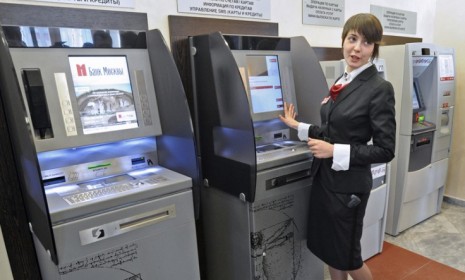Russia's 'KGB-style,' lie-detecting ATMs
The country's largest retail bank is testing a machine that uses voice-analysis software to judge whether loan applicants are lying. Behold the future of banking?

A free daily email with the biggest news stories of the day – and the best features from TheWeek.com
You are now subscribed
Your newsletter sign-up was successful
Sberbank, the biggest retail bank in Russia, is testing a "KGB-style" ATM at branches around the country. The machine aims to prevent fraud and theft, while allowing customers to conduct complicated banking transactions with no human interaction at all. So what's the story behind this new ATM that "the old KGB would have loved?" Here, a brief guide:
What exactly do these ATMs do?
A lot more than merely dispense cash. They are equipped with built-in lie detectors, passport scanners, finger print sensors, and facial recognition software, which combined will allow consumers — including those with no previous relationship to the bank — to sign up for a credit card, or apply for a loan, right from the machine.
The Week
Escape your echo chamber. Get the facts behind the news, plus analysis from multiple perspectives.

Sign up for The Week's Free Newsletters
From our morning news briefing to a weekly Good News Newsletter, get the best of The Week delivered directly to your inbox.
From our morning news briefing to a weekly Good News Newsletter, get the best of The Week delivered directly to your inbox.
How does the lie-detection work?
Each machine has a voice analysis system. When a customer uses it to apply for a loan, for example, the ATM will ask questions like, "Are you employed?" and "At this moment, do you have an other outstanding loans?" says Andrew E. Kramer at The New York Times. The machine detects nervousness and emotional distress in the customer's voice, and concludes whether he or she is telling the truth. Changes in tone and pace of speech are "nervous reactions" that result involuntarily when a person is "agitated."
What's the point?
Security, and fraud protection. In addition to the lie detecting software, the ATMs have the ability to corroborate a customer's personal information with fingerprinting, facial recognition, and, eventually, passport scanning — making every transaction "comically secure," says Graeme McMillan at TIME. Plus, in the past, too many Russians struggled with loans that they could not or would not repay, says Sberbank's Victor M. Orlovsky. The hope is that these machines can weed out future negligent debtors better than human bankers did.
A free daily email with the biggest news stories of the day – and the best features from TheWeek.com
What is the KGB connection?
"While many things in Russia sound like offshoots of a former time when KGB ran the streets, these talking ATMs are actually from the loins of the KGB," says Kat Hannaford at Gizmodo. The voice-analysis system used by the machines was developed by the Speech Technology Center, which counts the KGB's intel descendants as one of its biggest clients. Given that connection, says Christina Grossman at Slate, "it should not come as a surprise" that the voice recordings used to design the lie-detecting software are actually people found to be lying during Soviet police interrogations.
Is this legal?
Sberbank maintains that it is. "We are not violating a client's privacy," says Orlovsky. "We are just trying to find out if they are telling the truth."
When are these machines coming stateside?
While Deutsche Bank and Citigroup have tested "futuristic technologies" at branches in Berlin, Tokyo, and New York, none include lie detectors. Though American ATM are evolving, too, expect nothing more radical than advanced touchscreens. We haven't reached Minority Report levels of security, yet.
-
 Trump touts pledges at 1st Board of Peace meeting
Trump touts pledges at 1st Board of Peace meetingSpeed Read At the inaugural meeting, the president announced nine countries have agreed to pledge a combined $7 billion for a Gaza relief package
-
 Britain’s ex-Prince Andrew arrested over Epstein ties
Britain’s ex-Prince Andrew arrested over Epstein tiesSpeed Read The younger brother of King Charles III has not yet been charged
-
 Political cartoons for February 20
Political cartoons for February 20Cartoons Friday’s political cartoons include just the ice, winter games, and more